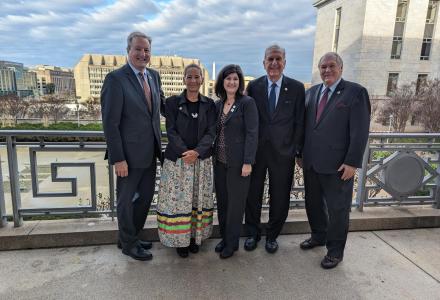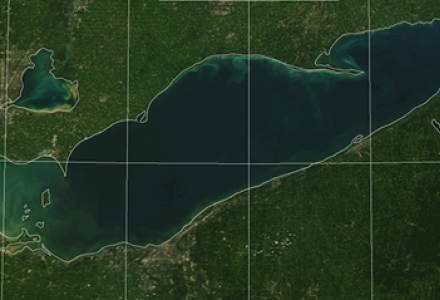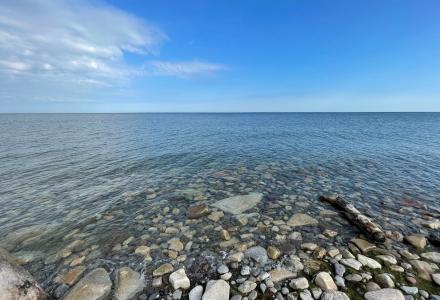
Since the IJC’s Great Lakes Water Quality Board published its 2015 and 2018 binational poll reports, further analysis has uncovered additional findings. Because the 2018 survey repeated all questions from the 2015 survey, the combined samples represent 8,200 respondents to nearly 90 questions.
A few interesting questions jump out from the data:
- Is there broad belief across the Great Lakes basin that the health of the Great Lakes affects our health and the health of the region’s economy?
- What is Indigenous people’s perspective toward Great Lakes health?
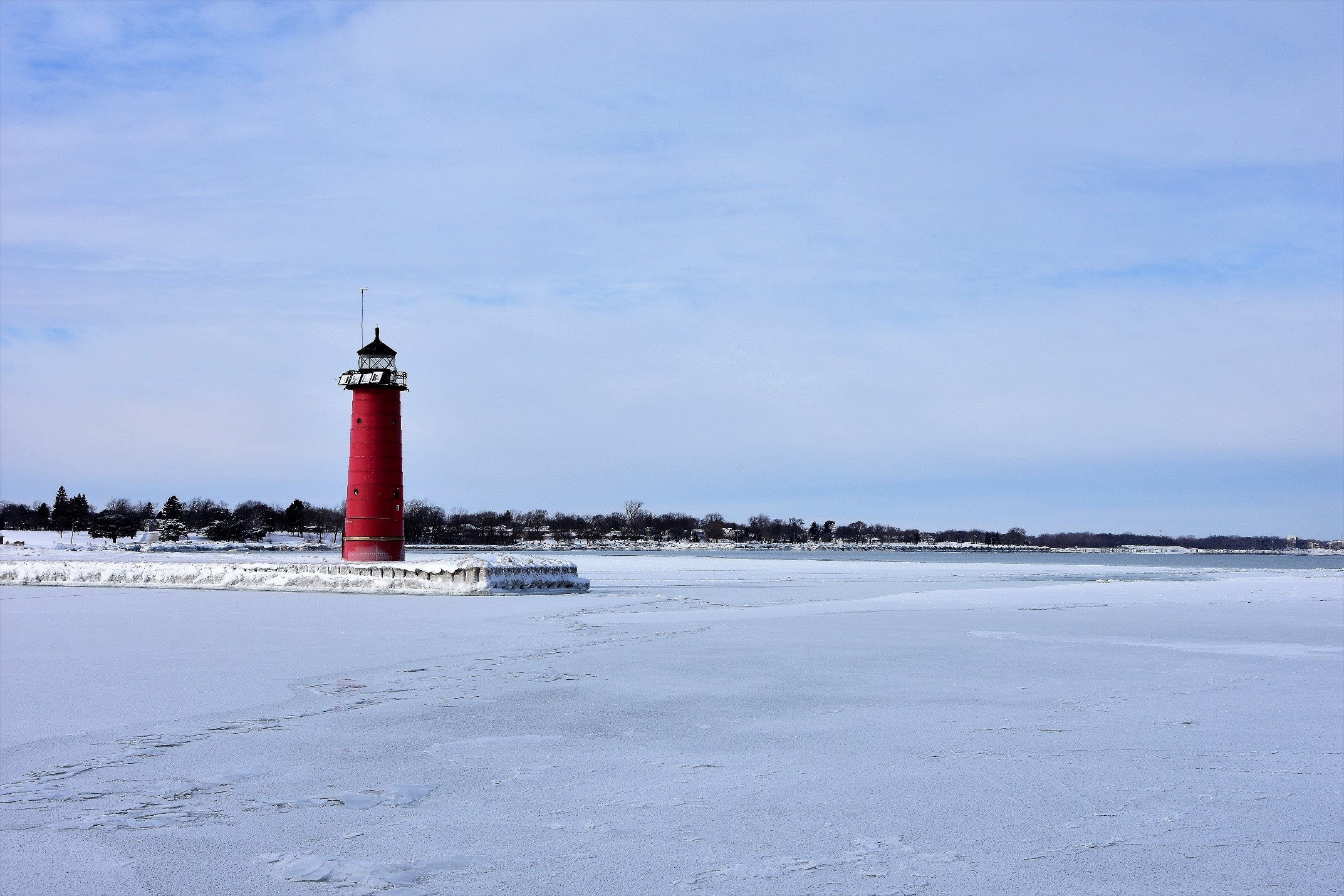
Two survey questions addressed Great Lakes residents’ perceptions of the health of the Great Lakes and its impact on public health and the regional economy.
When survey respondents were asked their level of agreement with the value statement, “The health of residents in the region will suffer without healthy Great Lakes,” the majority (73.3 percent) of all 8,200 respondents responded with “Agree” or “Strongly agree.”
To the value statement, “The economy of the region will suffer if the Great Lakes are not healthy,” the majority (76.7 percent) again was in agreement. However, nuances to the responses emerged when demographic variables, such as state or province of residency and Indigenous status, were analyzed with Pearson’s chi-squared tests (of how likely any observed distribution is due to chance).


These graphs show the distribution of level-of-agreement responses to the 2015 and 2018 binational polls. Credit: Author
Are the differences in beliefs based on where the respondents lived?
When analyzed for differences across state or province, there was no statistical difference among responses to either statement. This means that respondents from all eight Great Lakes states and Ontario were broadly unified in agreement that public health and the region’s economy will suffer without healthy Great Lakes. Notice the high level of agreement with these two statements from each Great Lakes residential area shown in the graphs below.
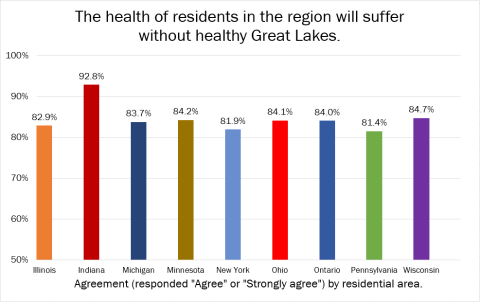
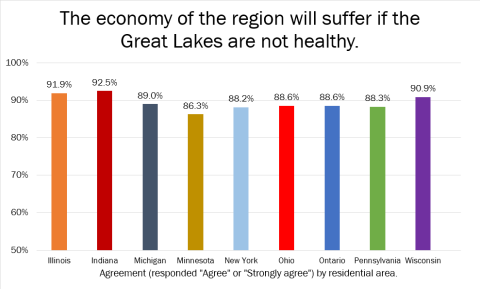
These graphs show the proportion of respondents in agreement by their state/province of residency. Credit: Author
What is the perspective of Indigenous people on these issues?
For the 2018 poll, the IJC sought responses from people who identify as Indigenous (First Nations, Métis and Tribes) from each lake basin to gain insights on their unique perspectives. Of the 4,250 responses to the 2018 poll, 300 responses (7.1 percent) were from people who identified as Indigenous. When these two value statements were analyzed for differences between respondents who identified as Indigenous and those who did not, there were statistical differences to both the statement about public health and the region’s economy.
This means the Indigenous respondents were more likely to agree that the health of the Great Lakes affects public health and the region’s economy. The graphs below show the differences in agreement from respondents who identified as Indigenous and those who did not.


These graphs show the differences in agreement between Indigenous and non-Indigenous respondents. Credit: Author
What does it all mean?
These results indicate that residents across the Great Lakes basin, especially Indigenous people, are broadly united in their belief that the health of the Great Lakes is crucial to public health and the regional economy.
This is consistent with the findings from a report submitted to the Ontario Ministry of the Environment in 2010 and other research led by Alan Steinman from the Annis Water Resources Institute in Muskegon, Michigan, which showed that protecting the Great Lakes provides society with a variety of ecosystem services and has tremendous economic value across dozens of sectors.
Additionally, more than $1.7 billion of investments to restore the Great Lakes have been made through government funding programs, such as the Canadian Great Lakes Protection Initiative and US Great Lakes Restoration Initiative (GLRI).
The University of Michigan’s Research Seminar in Quantitative Economics and a panel of economists determined that every GLRI project dollar spent from 2010-2016 will produce $3.35 of additional economic activity through 2036, which represents a 300 percent return on investment. This panel also found that the GLRI created or supported an average of 5,180 jobs per year and increased personal income by an average of $250 million per year in the Great Lakes region from 2010-2016.
How do these beliefs translate into personal and collective actions to conserve and protect the Great Lakes? How much are residents willing to pay for Great Lakes research, management and protections? Research to answer these questions based on the poll’s existing results is underway and will be considered as the next iteration of the Great Lakes poll is developed.
Over time, the poll’s ongoing results will help to further define how the Great Lakes community can more effectively take personal and collective actions to pursue the goal of swimmable, drinkable, fishable water for everyone.

Ryan C. Graydon is the Ohio Sea Grant Fellow at the International Joint Commission’s Great Lakes Regional Office in Windsor, Ontario, where he is performing research in support of the Great Lakes Water Quality Board and the Health Professionals Advisory Board.

